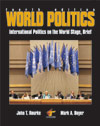Breathtaking change has been the most common theme in books about international politics written during the last decade. "The onset of the post-Cold War era in 1990 entailed far more sweeping and revolutionary changes than were even apparent at the time," one study begins (Klare & Chandrani, 1998:vii). "These are exciting times to study global politics...We have entered into a period of turbulent transitions," another study declares on the first page of its preface (Mansbach & Rhodes, 2000:xi). Such sentiments are not new. We humans have often chafed at the world in which we live and have yearned to change it. "Had I been present at the creation, I would have given some useful hints for the better ordering of the universe," a dismayed King Alfonso the Wise (1221-1284) of Castile and León (in what is now Spain) once mused. One of the suggestions heard often over the course of human history is that people take a broader, more inclusive view of humanity. This call for change reflects frustration with the traditional way that we humans organize ourselves politically along ethnonational lines. Whether that political organization is the modern nation-state or some earlier form, such as the city-state, there have been critics who urge that we look beyond such territorially bounded structures and adopt transnational affiliations as an alternative to traditional identification with and loyalty to the nation-state. | 


 2002 McGraw-Hill Higher Education
2002 McGraw-Hill Higher Education